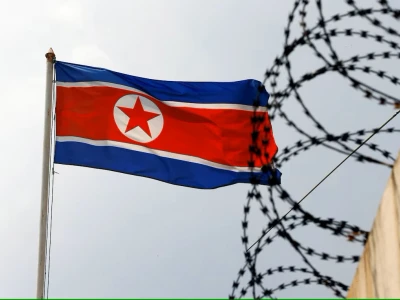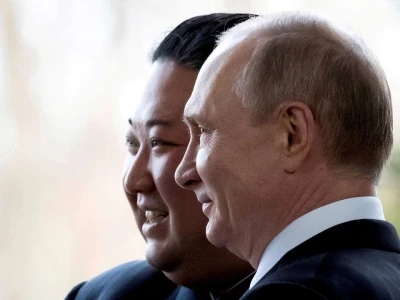
Putin remarks about possible weapons for North Korea 'incredibly concerning'-US
"This picture says it all," Blumenthal told a news conference, holding up a photo of Putin’s welcome in Pyongyang.
WASHINGTON, June 20 (Reuters) - Comments by Russian President Vladimir Putin on Thursday that Russia may supply weapons for North Korea after signing a defense pact with Pyongyang are "incredibly concerning," U.S. State Department spokesperson Matthew Miller said.
Putin suggested after a visit to North Korea this week that such weapons supplies to the isolated nuclear-armed country would be a mirror response to the Western arming of Ukraine.
As the Northern Hemisphere marked the first day of summer on Thursday, countries across the continent endured yet another week of blistering temperatures.
He also warned that U.S. ally South Korea would be making "a big mistake" if it decided to supply arms to Ukraine, and that Moscow would respond to such a move in a way that would be painful for Seoul.
"It is incredibly concerning," Miller told a news briefing when asked about Putin's remarks about possible arms supplies to North Korea.
"It would destabilize the Korean Peninsula, of course, and potentially ... depending on the type of weapons they provide, might violate U.N. Security Council resolutions that Russia itself has supported."
The treaty signed by Putin and Kim on Wednesday commits each side to provide immediate military assistance to the other in the event of armed aggression against either one of them.
White House national security spokesperson John Kirby said called it a cause of concern but no surprise. He said Russia's need for such foreign assistance was a sign of desperation.
"We've been talking about this and warning about a burgeoning defense relationship between these two countries now for many months through a series of downgraded intelligence that we've put out there," he said.
"Obviously it's something we've taken seriously."
Kirby said the U.S. also believed the Russia-North Korea pact would also be a concern to China, which the United States has urged to do more to reign in Pyongyang.
The head of NATO said on Tuesday he is concerned about support Russia could provide for North Korea's missile and nuclear programs.
U.S. officials have said they believe North Korea is keen to acquire fighter aircraft, surface-to-air missiles, armored vehicles, ballistic missile production equipment or materials, and other advanced technologies from Russia.
The United States and Ukraine say North Korea has already provided Russia with significant quantities of artillery shells and ballistic missiles, which Moscow and Pyongyang deny.
Western countries have condemned Russia for vetoing an extension of the mandate of a U.N. body charged with monitoring international sanctions on North Korea to which Russia remains a signatory
Kirby also said the Biden administration had been bolstering its alliances and partnerships in the Indo-Pacific and cited a trilateral deal with Japan and South Korea, the AUKUS pact to supply Australia with nuclear-powered submarines and stepped-up ties with the Philippines.
Two U.S. senators, Republican Senator Lindsey Graham and Democratic Senator Richard Blumenthal, said Putin's visit to North Korea was an additional incentive for the U.S. to formally designate Russia as a state sponsor of terrorism.
"This picture says it all," Blumenthal told a news conference, holding up a photo of Putin’s welcome in Pyongyang.
The two senators have been pushing the legislation since 2022 but President Joe Biden's administration has said it does not feel that the designation is the most effective way to hold Russia accountable over Ukraine.
Moscow has told Washington that diplomatic ties would be badly damaged and could even be broken off if Russia were added to the list, which includes Iran, North Korea, Cuba and Syria.
Related
Related

Russia's Putin and North Korea's Kim sign mutual defence pact

Putin flies into North Korea with promise to back it against US

North Korea conducts first "nuclear trigger" simulation drills

